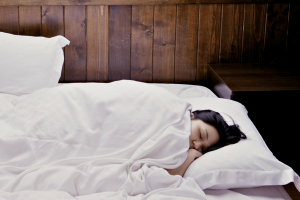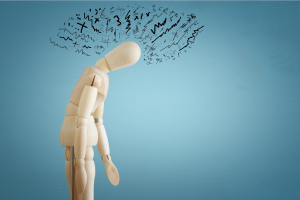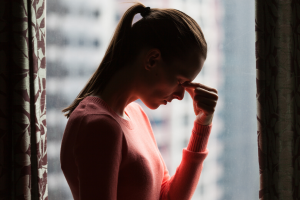How to Escape the Vicious Cycle of Anxiety and Insomnia: A 10-Step Guide
 As far as nasty bedfellows go, anxiety and sleep deprivation are insidious. Each is the other’s self-fulfilling prophecy.
As far as nasty bedfellows go, anxiety and sleep deprivation are insidious. Each is the other’s self-fulfilling prophecy.
The more you give in to worry, the more likely you are to lose sleep over it. The more you struggle with insomnia, the more likely you are to feel anxious. You start worrying that you won’t be able to fall asleep—and then you don’t. You do not sleep, and the lack of rest makes you more vulnerable to anxiety.
If you’re one of between 50 and 70 million American adults who chronically suffer from some sleep or wakefulness disorder, you know the power of anxious thoughts over sleep. According to news from UC Berkeley researchers, lack of sleep plays a role in ramping up brain regions that trigger anxiety. And excessive worriers are more vulnerable to sleep disorders. “These findings help us realize that those people who are anxious by nature are the same people who will suffer the greatest harm from sleep deprivation,” said Matthew Walker, a professor of psychology and neuroscience at UC Berkeley and senior author of the study.
“Anxiety is an emotion that actually wakes us up,” says Dr. Steve Orma, who wrote Stop Worrying and Go to Sleep: How to Put Insomnia to Bed for Good. “There are all kinds of physical changes happening that ramp you up, which is the exact opposite state of what you need to be in when you’re trying to fall asleep.”
Everybody gets anxious sometimes. It can even be a good thing: Like pain, anxiety can be a signal that something needs attending to or correcting. But when tension, obsessive thoughts, elevated blood pressure, and other key markers of anxiety persist and get worse with time, they should be treated. According to The Cleveland Clinic, two-thirds of patients referred to sleep disorders centers have a psychiatric disorder. Anxiety disorders—which include generalized anxiety disorder, post-traumatic sleep disorder, obsessive compulsive disorder, and phobias—affect 40 million adults over 18 in the United States, which is 18 percent of the population. Fifty percent of patients diagnosed with generalized anxiety disorder have sleep disorders.
Because healthy, restful slumber has been shown to stabilize people’s moods and aid emotional regulation, it is especially key for people suffering from anxiety to sleep soundly. Insufficient sleep worsens anticipatory anxiety. According to UC Berkeley researchers, “By restoring good quality sleep in people suffering from anxiety, we may be able to help ameliorate their excessive worry and disabling fearful expectations.”
Sleep is a perfect facilitator of mindfulness—the kind of merciful distance toward negative experiences we all need in order to put them in context and move on despite them. Researchers at University of California Berkeley’s Sleep and Neuroimaging Laboratory found that the sleep-deprived brain reverts back to more primitive patterns of activity. The study participants who were kept awake were less likely to put emotionally-triggering information in context. The opposite is true, too. Getting better sleep allows people to resist anxiety. “By restoring good quality sleep in people suffering from anxiety, we may be able to help ameliorate their excessive worry and disabling fearful expectations,” said Allison Harvey, one of the authors of the study published in the Journal of Neuroscience.
The good news is that there are ways to break the cycle of anxiety and insomnia. You already know that an increase in anxiety can mean a decrease in sleep and that a decrease in sleep can mean an increase in anxiety. Take solace in the reality that the opposite is also true: the less you worry, the better you can sleep, and the better you sleep, the less power your anxieties have over you. Undermine just one of these factors, and you’re on the way to more restful slumber and less worry. How can you do that?
To the extent you can, follow these 10 simple steps of sleep hygiene that target anxiety as well.
10 Steps of Healthy Sleep Hygiene That Also Curb Anxiety
- Engage in physical activity during the day. Exercise helps you sleep by decreasing arousal, anxiety, and depression.
- Avoid caffeine in the afternoons and evenings.
- Develop a mindfulness meditation practice. The “mind-calming practice that focuses on breathing and awareness of the present moment” has been demonstrated to diminish anxiety and help you get rest at night.
- Avoid screen time two hours before bedtime.
- Sleep on a comfortable mattress. If you have conditions like back pain, which also coexist with anxiety, make sure you sleep on a mattress that cradles you just right and relieves your pressure points.
- Don’t use alcohol as a sleeping aid. The arousals produced by alcohol ultimately lead to anxiety and sleep deprivation.
- Fall asleep in a dark, quiet, and cool room.
- Ask your doctor whether underlying illnesses or medication side effects might be causing both your insomnia and anxiety.
- Develop self-soothing, sleep-inducing routine, drawing on things that make you feel ready for bed and calm (a relaxing bath, listening to a sleep meditation hypnosis app, etc).
- What has worked best for you so far in getting to sleep? Do that.










Leave a Reply
You must be logged in to post a comment.